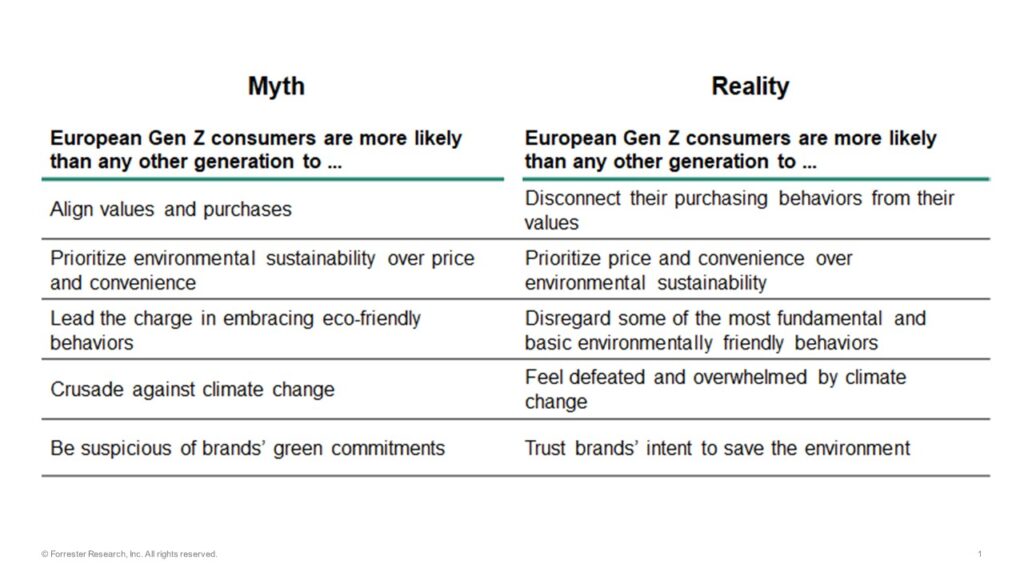Beware The Stereotype: Gen Z Isn’t The Most Actively Green Generation
Businesses and media tend to catalog Gen Z (individuals born between 1997 and 2012) as the sustainability generation. Media hype surrounding young environmental activists like Greta Thunberg reinforces this stereotype. But brands and retailers should beware this boilerplate assumption. Gen Z’s relationship with environmental sustainability is nuanced. This is especially true in Europe where the correlation between age and active green behaviors is less pronounced than in the United States.
Forrester’s Green Consumer Segmentation, 2023, shows that European Gen Z consumers* are less likely than the European average to be “active greens” (consumers who care about climate change, consider themselves environmentally conscious, and choose environmental sustainability over other purchase criteria) and more likely to be “convenient greens” (consumers who care about climate change but value convenience and price over environmental sustainability when shopping).
Counterintuitively, European Gen Z consumers don’t demonstrate the most exemplary sustainable behaviors. While climate change and environmental sustainability evoke strong emotions and generate engagement for this generation, this isn’t necessarily reflected in their purchasing behaviors. As younger consumers gain purchasing power, the winning brands will be those that earn trust today with this generation and lead with environmental messaging and actions while also making it easy to buy from them.
My colleague Melissa Chaudet and I have just published a brand new data-centric report that examines and deconstructs five myths that brands and retailers may have taken for granted:

Myth 1: Gen Z Aligns Values And Purchases
Gen Z should be nicknamed the “paradoxical generation.” They’re more likely than any other generation to disconnect their green purchasing behaviors from their values. Gen Z’s dissonance stems from the internal battle between their strong moral values and their baseline expectations for instantaneous, on-demand, and seamless experiences. As a result, their concerns about climate change don’t always translate into appropriate purchasing behaviors.
Myth 2: Gen Z Prioritizes Environmental Sustainability Over Price And Convenience
Gen Z is actually more likely than any other generation to prioritize price and convenience over environmental sustainability. Gen Z is more likely than any other generation to agree that a low-cost product is more valuable to them than an environmentally friendly product, and almost as likely as Millennials to agree that a product that saves them time and hassle is more valuable to them than green products.
Myth 3: Gen Z Leads The Charge In Embracing Eco-Friendly Behaviors
European Gen Z consumers are less likely than consumers from other generations to practice basic environmentally friendly behaviors, such as recycling or monitoring home energy usage. But they’re also less likely to own a property, meaning they won’t supervise or conduct as many home-related chores as their older counterparts.
Myth 4: Gen Z Is Most Likely To Crusade Against Climate Change
In fact, European Gen Z consumers can feel defeated and overwhelmed by climate change. One-third of European Gen Z online adults agree that reducing their environmental impact is too much work (more than twice as many as Baby Boomer and Silent Generation respondents).
Myth 5: Gen Z Is The Most Suspicious Of Brands’ Green Commitments
According to Forrester’s Consumer Europe Survey, 2022, European Gen Z and Millennial online adults are more likely than older generations to trust companies when they say they’ll commit to reducing climate change. Don’t get twisted, though: Only 38% of them do!
Tailor Your Sustainability Initiatives To Accommodate Gen Z’s Paradox
The good news for CMOs marketing their company’s green credentials to European Gen Z consumers is that they’re more likely than any other generation to engage with sustainable brands. Only 14% of European Gen Z online adults, compared to 29% for the European average, said they would do nothing if they discovered that a company was making changes to become more environmentally friendly. CMOs should do the following to engage European Gen Z consumers:
- Align brand and customer experiences to earn trust
- Launch green products and solutions that reconcile price and convenience
- Nudge customers to adopt eco-friendly behaviors, and reward them when they do
- Address eco-anxiety with authentic and empowering storytelling
- Embrace modern marketing tactics
Clients who want to know more about this and find examples of leading brands can read the report and schedule a guidance session with me. If you’re not a client, you can listen to this episode of the What It Means podcast where we discuss green consumer segmentation strategies.
*This analysis was conducted among 1,441 Gen Z online adults across seven European countries: France, Italy, Germany, Spain, Sweden, the Netherlands, and the UK.
